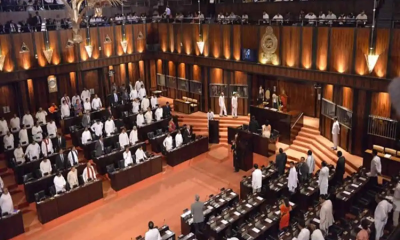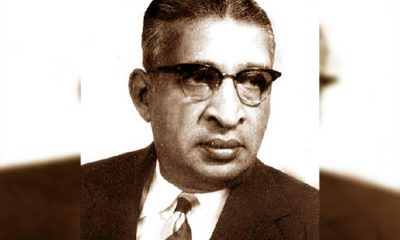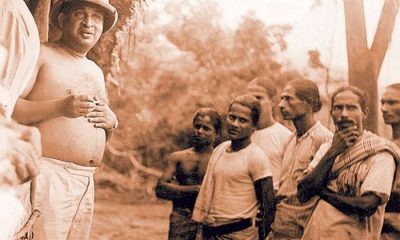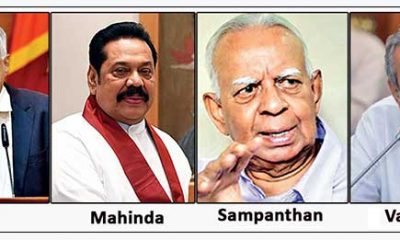Features
Dudley Senanayake (1911-1973): The gentle knight of Ceylon politics
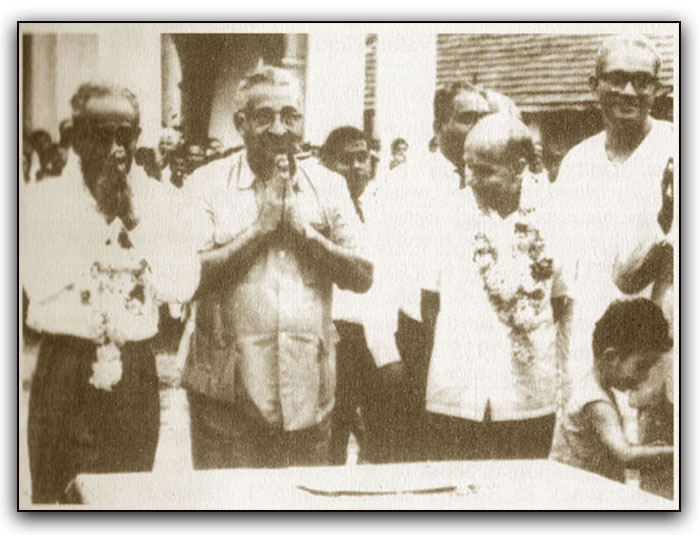
(Excerpted from Selected Journalism by HAJ Hulugalle)
“He was a verray parfit gentil knight”, in the words of the fourteenth century English poet Geoffrey Chaucer. Dudley Senananyake was a Minister at the age of 36 and four times Prime Minister. He won the respect and affection of millions, many of whom had never seen him, or know him only from his picture in a public print or a displayed poster.
Although he was a wise statesman and an experienced politician, there is something else which comes uppermost to the minds of those who pause to recall his public career of 38 years. I was working in my small garden after I had heard the news of his death. An elderly woman was plucking some jasmine flowers from a creeper in the fence. She too had heard the news and turning to me, said: “Such is our existence on this earth. Even the Lord Buddha had to die.”
It was a spontaneous reaction. She did not feel that there was any profanity in the comparison. The affection she showed for someone she could not have known, as if he had been her own son, will be shared by everyone who can value a man as a human being, forgetting all the trappings of authority, position and power.
The shock of Dudley’s death cannot but generate an upsurge of sentiment in every part of the country. It is easy to give way to adulation on such an. occasion. But there is no need for it when the facts can speak for themselves. The worst that can be said about him is that, while being a politician, he had no craving to wield power, to impose his will and to regard himself as the man of destiny. He had other values, and he was content to do what he thought was his duty.
The reluctant tribute of a journalist friend of mine, who usually opposed Dudley’s politics, was couched in these words: “The disciplined intellectual virtues of justice of heart and mind, the proud shyness that comes of high mental attainments, and the sensitive dignity the results of exceedingly good breeding, in themselves are great qualities devoutly to be wished”.
I was editor of the “Ceylon Daily News” when Dudley entered the State Council in 1935 and during almost 13 years of his public career thereafter. I had no occasion to ask him any favours nor to grant him any. When he was appointed a Minister in D.S. Senanayake’s first Cabinet in 1947 I felt that there might be an element of nepotism about it.
Without reference to D.R. Wijewardene, who was of course a close friend of D.S. Senanayake, I printed in the newspaper a letter criticizing the appointment. The letter touched a sensitive spot in the Prime Minister. I shall allow J.L. Fernando to tell what happened as recorded in his book “Three Prime Ministers of Ceylon”:
“There was no doubt that one reason which impelled Prime Minister D.S. Senanayake to appoint Dudley Senanayake, Minister of Agriculture in Ceylon’s first Cabinet, was his belief that he could continue to keep an eye on the Dry Zone colonization schemes if his own son presided over the Ministry in charge of them.
“There was some public criticism of the appointment of Dudley Senanayake, the son, to the Cabinet by the father. One morning when I returned home after my daily walk I heard that D.S. Senanayake had left a telephoned message to call him back to his home, Woodlands, Kanatte.
“When I called him I was quite embarrassed by his comments on a letter in the “Ceylon Daily News” of that morning, criticizing the report of the news that Dudley Senanayake might be appointed to the Cabinet. “Must I keep him out of the Cabinet because he is my son?” growled D.S. Senanayake, picking on me though he could have as easily telephoned his friend, D.R. Wijewardene, or H.A.J. Hulugalle, then the editor of the “Ceylon Daily News”.
“I remember mumbling my ignorance regarding the letter which I had myself seen before I left on my morning walk. Some days later I recall his explaining to me the reasons for appointing Dudley Senanayake to that particular Ministry. Whatever the reasons, there is no doubt that Dudley Senanayake’s record in that Ministry fully justified his appointment”.
A more impartial historian, Professor S.A. Pakeman, in his book entitled “Ceylon” makes the following comment:
“It was freely said at the time that he (D.S.) wanted to run the Ministry of Agriculture, and that he had therefore appointed his son to that office. Events, however, were to show that Dudley Senanayake was quite capable of taking his own line, and in fact he proved a capable Minister of Agriculture. His father had, of course, during his ministry, laid down the lines on which this, the most essential ministry, except that of Finance, should proceed. But the son did not hesitate to make changes and developments where he thought them desirable”.
It did not take me long to realize that I had been mistaken.
When D.S. Senanayake died in March 1952, maneuvering for (the succession) had already got under way in the reception hall of the Central Hospital. I was then in charge of Government information and moved among Members of Parliament assembled there. I could see how, on the initiative of MP’s like Eddie Nugawela and Noel Gratiaen, opinion was swaying in favour of Dudley, who was himself quite unconcerned. Had S.W.R.D. Bandaranaike not left the party in 1951 he would have had Dudley’s support for the Premiership.
Lord Soulbury, who was the Governor – General at the time, told a friend later that he had had a talk with D.S. Senanayake before his last illness about who should succeed him if he was suddenly disabled. The elder Senanayake was not prepared to make a nomination, or suggest names, but said that he would not be surprised if the majority in the cabinet and among back-benchers favour a summons to Dudley should the occasion arise.
Dudley did not seem to have the necessary steel in his make-up to ride the storm and make a success of his first Premiership. His, in some respects, was a complex character. He had had it easy as the son of his over-powering father. A political career was open to him for the asking. Nothing brings out a man’s grit as hardship, opposition and slender means.
To one who did not know him intimately, the absence of a partner who could have given him a happy life, look after his health and spur him to ambitious deeds seemed to be a serious handicap, if not a tragedy in Dudley’s life. Verily, these things are on the knees of the gods, and it is not for mere mortals to regret what they decree.
The first set-back was, however, not the end of the story. Dudley came back to the leadership after a brief sojourn in the wilderness and during the years from 1965 to 1970 he was again in command. He was always a leader even without the gnawing desire to lead. The diffidence to wield power may be a weakness in a politician but it is an acknowledgment of qualities which transcend pure partisanship. There was nothing which his colleagues and subordinates were not prepared to do at his bidding without any expectation of reward or recognition.
He was not a leader by virtue of his being the son of a great man. He was no rubber-stamp of his parent. He was a leader from his schooldays, a captain whom others were glad to follow. Boys have a sound instinct in these matters. Indeed he embodied in his life the best characteristics of the schools which produced most of the country’s leaders and continue to do so even today. Every Thomian, past and present, was proud of him.
But political craftiness is again something else. Dudley was short on it. Of few men in our public life could the words of Abraham Lincoln be more justly used: “With malice towards none, with charity for all, with firmness in the right as God gives us to see the right, let us strive on to finish the work we are in.”
He met with Triumph and Disaster and treated those two impostors just the same. He accepted the slings and arrows of outrageous fortune in politics with a philosophic mind. This is not to say that he was not a fighter. His combative qualities asserted themselves when occasion demanded, especially in defeat.
What redeemed his politics from being a. form of sport with which he was all too familiar was his compassion. The quality of compassion was probably what appealed to him most in his Buddhist faith. He felt deeply for the poor and, in his travels around the country, he knew all about the debilitating and degenerating effects of grinding poverty.
Dudley had too soft a heart to be a forceful politician or a ruthless administrator. Nothing gave him more pleasure that to help a lame dog over a stile. His culture was what Matthew Arnold called “the passion for sweetness and light, and (what is more) the passion for making them prevail”. A short time before he passed away he turned to a nephew who stood by him and said that he was happy he had been able to do in his life much of what he had wished to do.The country has lost a beloved leader. For years to come, it will retain the memory of a noble, unselfish and kindly human Politician who did not crave for power.
(This article first appeared in the Ceylon Daily News of April 16, 1973)
Features
The heart-friendly health minister

by Dr Gotabhya Ranasinghe
Senior Consultant Cardiologist
National Hospital Sri Lanka
When we sought a meeting with Hon Dr. Ramesh Pathirana, Minister of Health, he graciously cleared his busy schedule to accommodate us. Renowned for his attentive listening and deep understanding, Minister Pathirana is dedicated to advancing the health sector. His openness and transparency exemplify the qualities of an exemplary politician and minister.
Dr. Palitha Mahipala, the current Health Secretary, demonstrates both commendable enthusiasm and unwavering support. This combination of attributes makes him a highly compatible colleague for the esteemed Minister of Health.
Our discussion centered on a project that has been in the works for the past 30 years, one that no other minister had managed to advance.
Minister Pathirana, however, recognized the project’s significance and its potential to revolutionize care for heart patients.
The project involves the construction of a state-of-the-art facility at the premises of the National Hospital Colombo. The project’s location within the premises of the National Hospital underscores its importance and relevance to the healthcare infrastructure of the nation.
This facility will include a cardiology building and a tertiary care center, equipped with the latest technology to handle and treat all types of heart-related conditions and surgeries.
Securing funding was a major milestone for this initiative. Minister Pathirana successfully obtained approval for a $40 billion loan from the Asian Development Bank. With the funding in place, the foundation stone is scheduled to be laid in September this year, and construction will begin in January 2025.
This project guarantees a consistent and uninterrupted supply of stents and related medications for heart patients. As a result, patients will have timely access to essential medical supplies during their treatment and recovery. By securing these critical resources, the project aims to enhance patient outcomes, minimize treatment delays, and maintain the highest standards of cardiac care.
Upon its fruition, this monumental building will serve as a beacon of hope and healing, symbolizing the unwavering dedication to improving patient outcomes and fostering a healthier society.We anticipate a future marked by significant progress and positive outcomes in Sri Lanka’s cardiovascular treatment landscape within the foreseeable timeframe.
Features
A LOVING TRIBUTE TO JESUIT FR. ALOYSIUS PIERIS ON HIS 90th BIRTHDAY

by Fr. Emmanuel Fernando, OMI
Jesuit Fr. Aloysius Pieris (affectionately called Fr. Aloy) celebrated his 90th birthday on April 9, 2024 and I, as the editor of our Oblate Journal, THE MISSIONARY OBLATE had gone to press by that time. Immediately I decided to publish an article, appreciating the untiring selfless services he continues to offer for inter-Faith dialogue, the renewal of the Catholic Church, his concern for the poor and the suffering Sri Lankan masses and to me, the present writer.
It was in 1988, when I was appointed Director of the Oblate Scholastics at Ampitiya by the then Oblate Provincial Fr. Anselm Silva, that I came to know Fr. Aloy more closely. Knowing well his expertise in matters spiritual, theological, Indological and pastoral, and with the collaborative spirit of my companion-formators, our Oblate Scholastics were sent to Tulana, the Research and Encounter Centre, Kelaniya, of which he is the Founder-Director, for ‘exposure-programmes’ on matters spiritual, biblical, theological and pastoral. Some of these dimensions according to my view and that of my companion-formators, were not available at the National Seminary, Ampitiya.
Ever since that time, our Oblate formators/ accompaniers at the Oblate Scholasticate, Ampitiya , have continued to send our Oblate Scholastics to Tulana Centre for deepening their insights and convictions regarding matters needed to serve the people in today’s context. Fr. Aloy also had tried very enthusiastically with the Oblate team headed by Frs. Oswald Firth and Clement Waidyasekara to begin a Theologate, directed by the Religious Congregations in Sri Lanka, for the contextual formation/ accompaniment of their members. It should very well be a desired goal of the Leaders / Provincials of the Religious Congregations.
Besides being a formator/accompanier at the Oblate Scholasticate, I was entrusted also with the task of editing and publishing our Oblate journal, ‘The Missionary Oblate’. To maintain the quality of the journal I continue to depend on Fr. Aloy for his thought-provoking and stimulating articles on Biblical Spirituality, Biblical Theology and Ecclesiology. I am very grateful to him for his generous assistance. Of late, his writings on renewal of the Church, initiated by Pope St. John XX111 and continued by Pope Francis through the Synodal path, published in our Oblate journal, enable our readers to focus their attention also on the needed renewal in the Catholic Church in Sri Lanka. Fr. Aloy appreciated very much the Synodal path adopted by the Jesuit Pope Francis for the renewal of the Church, rooted very much on prayerful discernment. In my Religious and presbyteral life, Fr.Aloy continues to be my spiritual animator / guide and ongoing formator / acccompanier.
Fr. Aloysius Pieris, BA Hons (Lond), LPh (SHC, India), STL (PFT, Naples), PhD (SLU/VC), ThD (Tilburg), D.Ltt (KU), has been one of the eminent Asian theologians well recognized internationally and one who has lectured and held visiting chairs in many universities both in the West and in the East. Many members of Religious Congregations from Asian countries have benefited from his lectures and guidance in the East Asian Pastoral Institute (EAPI) in Manila, Philippines. He had been a Theologian consulted by the Federation of Asian Bishops’ Conferences for many years. During his professorship at the Gregorian University in Rome, he was called to be a member of a special group of advisers on other religions consulted by Pope Paul VI.
Fr. Aloy is the author of more than 30 books and well over 500 Research Papers. Some of his books and articles have been translated and published in several countries. Among those books, one can find the following: 1) The Genesis of an Asian Theology of Liberation (An Autobiographical Excursus on the Art of Theologising in Asia, 2) An Asian Theology of Liberation, 3) Providential Timeliness of Vatican 11 (a long-overdue halt to a scandalous millennium, 4) Give Vatican 11 a chance, 5) Leadership in the Church, 6) Relishing our faith in working for justice (Themes for study and discussion), 7) A Message meant mainly, not exclusively for Jesuits (Background information necessary for helping Francis renew the Church), 8) Lent in Lanka (Reflections and Resolutions, 9) Love meets wisdom (A Christian Experience of Buddhism, 10) Fire and Water 11) God’s Reign for God’s poor, 12) Our Unhiddden Agenda (How we Jesuits work, pray and form our men). He is also the Editor of two journals, Vagdevi, Journal of Religious Reflection and Dialogue, New Series.
Fr. Aloy has a BA in Pali and Sanskrit from the University of London and a Ph.D in Buddhist Philosophy from the University of Sri Lankan, Vidyodaya Campus. On Nov. 23, 2019, he was awarded the prestigious honorary Doctorate of Literature (D.Litt) by the Chancellor of the University of Kelaniya, the Most Venerable Welamitiyawe Dharmakirthi Sri Kusala Dhamma Thera.
Fr. Aloy continues to be a promoter of Gospel values and virtues. Justice as a constitutive dimension of love and social concern for the downtrodden masses are very much noted in his life and work. He had very much appreciated the commitment of the late Fr. Joseph (Joe) Fernando, the National Director of the Social and Economic Centre (SEDEC) for the poor.
In Sri Lanka, a few religious Congregations – the Good Shepherd Sisters, the Christian Brothers, the Marist Brothers and the Oblates – have invited him to animate their members especially during their Provincial Congresses, Chapters and International Conferences. The mainline Christian Churches also have sought his advice and followed his seminars. I, for one, regret very much, that the Sri Lankan authorities of the Catholic Church –today’s Hierarchy—- have not sought Fr.
Aloy’s expertise for the renewal of the Catholic Church in Sri Lanka and thus have not benefited from the immense store of wisdom and insight that he can offer to our local Church while the Sri Lankan bishops who governed the Catholic church in the immediate aftermath of the Second Vatican Council (Edmund Fernando OMI, Anthony de Saram, Leo Nanayakkara OSB, Frank Marcus Fernando, Paul Perera,) visited him and consulted him on many matters. Among the Tamil Bishops, Bishop Rayappu Joseph was keeping close contact with him and Bishop J. Deogupillai hosted him and his team visiting him after the horrible Black July massacre of Tamils.
Features
A fairy tale, success or debacle

Sri Lanka-Singapore Free Trade Agreement
By Gomi Senadhira
senadhiragomi@gmail.com
“You might tell fairy tales, but the progress of a country cannot be achieved through such narratives. A country cannot be developed by making false promises. The country moved backward because of the electoral promises made by political parties throughout time. We have witnessed that the ultimate result of this is the country becoming bankrupt. Unfortunately, many segments of the population have not come to realize this yet.” – President Ranil Wickremesinghe, 2024 Budget speech
Any Sri Lankan would agree with the above words of President Wickremesinghe on the false promises our politicians and officials make and the fairy tales they narrate which bankrupted this country. So, to understand this, let’s look at one such fairy tale with lots of false promises; Ranil Wickremesinghe’s greatest achievement in the area of international trade and investment promotion during the Yahapalana period, Sri Lanka-Singapore Free Trade Agreement (SLSFTA).
It is appropriate and timely to do it now as Finance Minister Wickremesinghe has just presented to parliament a bill on the National Policy on Economic Transformation which includes the establishment of an Office for International Trade and the Sri Lanka Institute of Economics and International Trade.
Was SLSFTA a “Cleverly negotiated Free Trade Agreement” as stated by the (former) Minister of Development Strategies and International Trade Malik Samarawickrama during the Parliamentary Debate on the SLSFTA in July 2018, or a colossal blunder covered up with lies, false promises, and fairy tales? After SLSFTA was signed there were a number of fairy tales published on this agreement by the Ministry of Development Strategies and International, Institute of Policy Studies, and others.
However, for this article, I would like to limit my comments to the speech by Minister Samarawickrama during the Parliamentary Debate, and the two most important areas in the agreement which were covered up with lies, fairy tales, and false promises, namely: revenue loss for Sri Lanka and Investment from Singapore. On the other important area, “Waste products dumping” I do not want to comment here as I have written extensively on the issue.
1. The revenue loss
During the Parliamentary Debate in July 2018, Minister Samarawickrama stated “…. let me reiterate that this FTA with Singapore has been very cleverly negotiated by us…. The liberalisation programme under this FTA has been carefully designed to have the least impact on domestic industry and revenue collection. We have included all revenue sensitive items in the negative list of items which will not be subject to removal of tariff. Therefore, 97.8% revenue from Customs duty is protected. Our tariff liberalisation will take place over a period of 12-15 years! In fact, the revenue earned through tariffs on goods imported from Singapore last year was Rs. 35 billion.
The revenue loss for over the next 15 years due to the FTA is only Rs. 733 million– which when annualised, on average, is just Rs. 51 million. That is just 0.14% per year! So anyone who claims the Singapore FTA causes revenue loss to the Government cannot do basic arithmetic! Mr. Speaker, in conclusion, I call on my fellow members of this House – don’t mislead the public with baseless criticism that is not grounded in facts. Don’t look at petty politics and use these issues for your own political survival.”
I was surprised to read the minister’s speech because an article published in January 2018 in “The Straits Times“, based on information released by the Singaporean Negotiators stated, “…. With the FTA, tariff savings for Singapore exports are estimated to hit $10 million annually“.
As the annual tariff savings (that is the revenue loss for Sri Lanka) calculated by the Singaporean Negotiators, Singaporean $ 10 million (Sri Lankan rupees 1,200 million in 2018) was way above the rupees’ 733 million revenue loss for 15 years estimated by the Sri Lankan negotiators, it was clear to any observer that one of the parties to the agreement had not done the basic arithmetic!
Six years later, according to a report published by “The Morning” newspaper, speaking at the Committee on Public Finance (COPF) on 7th May 2024, Mr Samarawickrama’s chief trade negotiator K.J. Weerasinghehad had admitted “…. that forecasted revenue loss for the Government of Sri Lanka through the Singapore FTA is Rs. 450 million in 2023 and Rs. 1.3 billion in 2024.”
If these numbers are correct, as tariff liberalisation under the SLSFTA has just started, we will pass Rs 2 billion very soon. Then, the question is how Sri Lanka’s trade negotiators made such a colossal blunder. Didn’t they do their basic arithmetic? If they didn’t know how to do basic arithmetic they should have at least done their basic readings. For example, the headline of the article published in The Straits Times in January 2018 was “Singapore, Sri Lanka sign FTA, annual savings of $10m expected”.
Anyway, as Sri Lanka’s chief negotiator reiterated at the COPF meeting that “…. since 99% of the tariffs in Singapore have zero rates of duty, Sri Lanka has agreed on 80% tariff liberalisation over a period of 15 years while expecting Singapore investments to address the imbalance in trade,” let’s turn towards investment.
Investment from Singapore
In July 2018, speaking during the Parliamentary Debate on the FTA this is what Minister Malik Samarawickrama stated on investment from Singapore, “Already, thanks to this FTA, in just the past two-and-a-half months since the agreement came into effect we have received a proposal from Singapore for investment amounting to $ 14.8 billion in an oil refinery for export of petroleum products. In addition, we have proposals for a steel manufacturing plant for exports ($ 1 billion investment), flour milling plant ($ 50 million), sugar refinery ($ 200 million). This adds up to more than $ 16.05 billion in the pipeline on these projects alone.
And all of these projects will create thousands of more jobs for our people. In principle approval has already been granted by the BOI and the investors are awaiting the release of land the environmental approvals to commence the project.
I request the Opposition and those with vested interests to change their narrow-minded thinking and join us to develop our country. We must always look at what is best for the whole community, not just the few who may oppose. We owe it to our people to courageously take decisions that will change their lives for the better.”
According to the media report I quoted earlier, speaking at the Committee on Public Finance (COPF) Chief Negotiator Weerasinghe has admitted that Sri Lanka was not happy with overall Singapore investments that have come in the past few years in return for the trade liberalisation under the Singapore-Sri Lanka Free Trade Agreement. He has added that between 2021 and 2023 the total investment from Singapore had been around $162 million!
What happened to those projects worth $16 billion negotiated, thanks to the SLSFTA, in just the two-and-a-half months after the agreement came into effect and approved by the BOI? I do not know about the steel manufacturing plant for exports ($ 1 billion investment), flour milling plant ($ 50 million) and sugar refinery ($ 200 million).
However, story of the multibillion-dollar investment in the Petroleum Refinery unfolded in a manner that would qualify it as the best fairy tale with false promises presented by our politicians and the officials, prior to 2019 elections.
Though many Sri Lankans got to know, through the media which repeatedly highlighted a plethora of issues surrounding the project and the questionable credentials of the Singaporean investor, the construction work on the Mirrijiwela Oil Refinery along with the cement factory began on the24th of March 2019 with a bang and Minister Ranil Wickremesinghe and his ministers along with the foreign and local dignitaries laid the foundation stones.
That was few months before the 2019 Presidential elections. Inaugurating the construction work Prime Minister Ranil Wickremesinghe said the projects will create thousands of job opportunities in the area and surrounding districts.
The oil refinery, which was to be built over 200 acres of land, with the capacity to refine 200,000 barrels of crude oil per day, was to generate US$7 billion of exports and create 1,500 direct and 3,000 indirect jobs. The construction of the refinery was to be completed in 44 months. Four years later, in August 2023 the Cabinet of Ministers approved the proposal presented by President Ranil Wickremesinghe to cancel the agreement with the investors of the refinery as the project has not been implemented! Can they explain to the country how much money was wasted to produce that fairy tale?
It is obvious that the President, ministers, and officials had made huge blunders and had deliberately misled the public and the parliament on the revenue loss and potential investment from SLSFTA with fairy tales and false promises.
As the president himself said, a country cannot be developed by making false promises or with fairy tales and these false promises and fairy tales had bankrupted the country. “Unfortunately, many segments of the population have not come to realize this yet”.
(The writer, a specialist and an activist on trade and development issues . )


